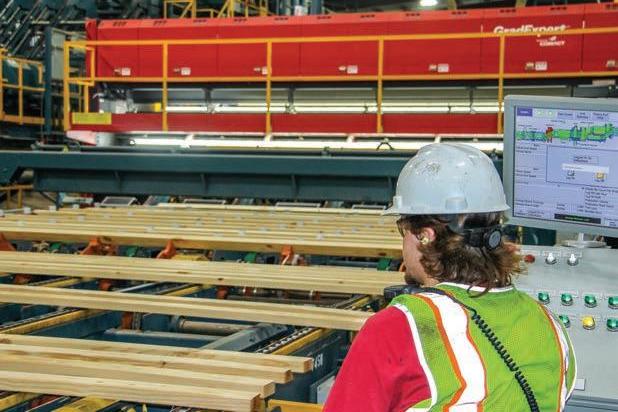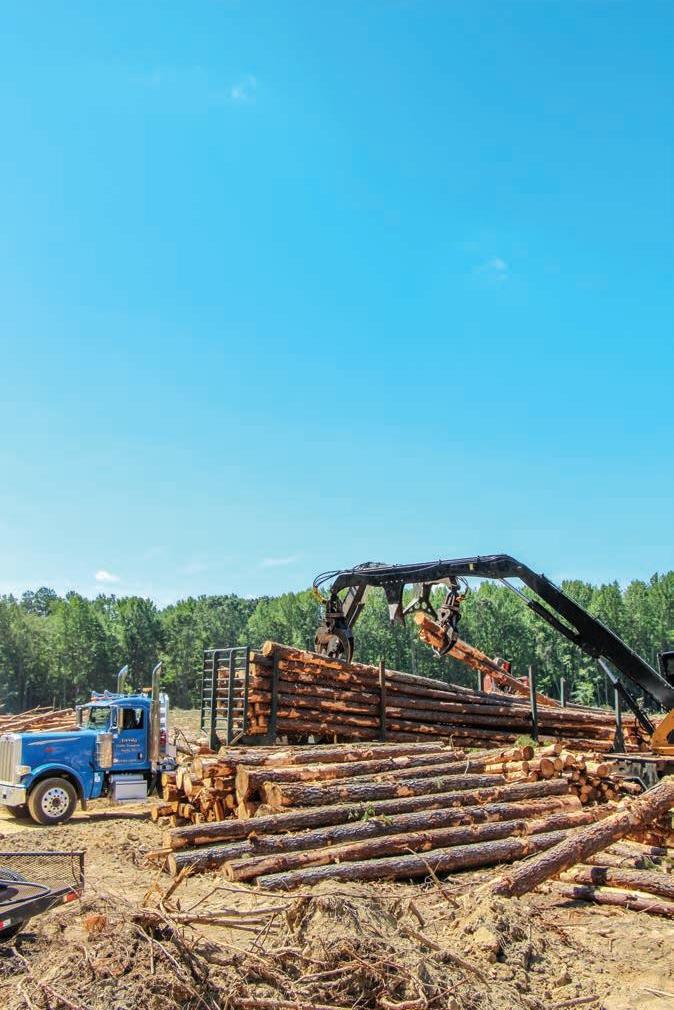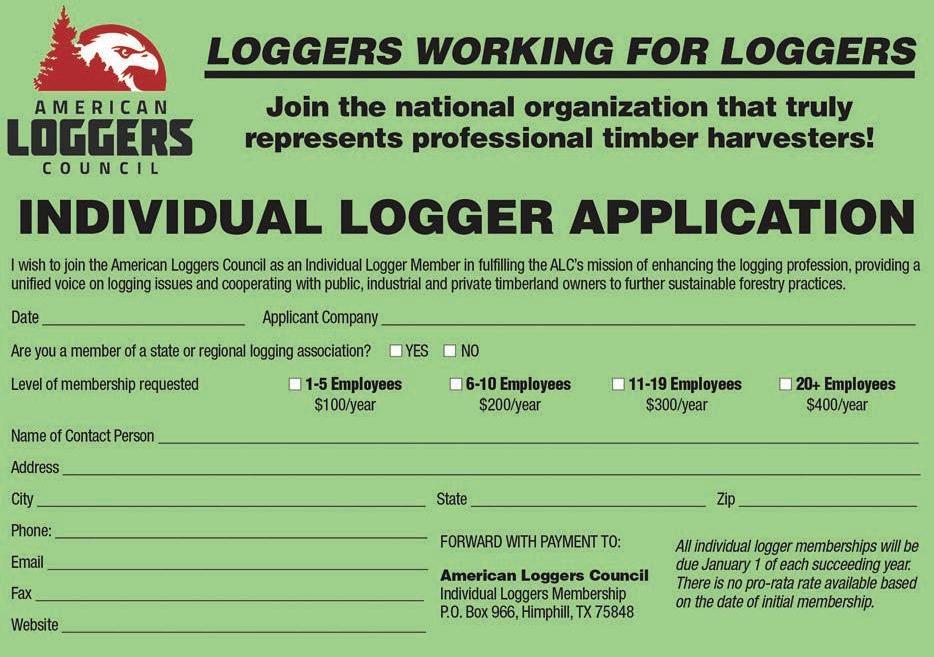
16 minute read
Industry News Roundup
As We See It: Let’s Get Started
By Tim Christopherson
There are many unknowns facing our logging families following the 2020 elections and for most of us, there are many unanswered questions for which we would like to have answers. Will the new appointees installed by the new administration affect what we do as loggers? Will the changes in the agencies that are involved in logging and trucking reverse the gains that we witnessed in the last four years? Will we see more regulations on our industry that have negative impacts on our operations?
Of particular interest to many of us in the Western states, and in other federal timber sale dependent communities across the United States, are the improvements that we have seen over the past four years in the ability of the U.S. Forest Service to put up timber sales with more success and to actually increase the volumes being offered. Will that continue? Stay tuned.
As of this writing, we received notice that the COVID Relief package contains a $200 million dollar component that is being set aside for logging and log trucking businesses across the U.S. that have been impacted by the COVID-19 pandemic. How will this be distributed? What determines your eligibility? The American Loggers Council and its many state and regional associations have been working to have those logging and log hauling businesses included in the package, but with success comes more questions, again… stay tuned!
Now that the Presidential election is finally confirmed, we are beginning to find out who we are working with and we will start a plan of attack to get our logging and trucking issues back on the table, working with the new ad ministration in the White House.
So far we have weathered administration changes over the past 26 years and have been able to work with decision makers on both sides of the aisle on multiple is sues. Our job is and will remain to educate those incoming legislators on our industry while keeping those veterans in Washington, DC updated on the issues that are impacting us the most.
In the meantime, take a look at our web site, amloggers.com, and take the 2020 ALC Logger survey while you’re there. Our Facebook page also contains information on the American Loggers Council and what we are up to. Both these pages will keep you updated on what’s going on at the ALC. You can also find the latest information on programs and how to apply for relief allowed in the COVID
Relief package as they becomes available.
Christopherson
Tim Christopherson is the coowner of Dabco, Inc., based out of Kamiah, Idaho and serves as the President of the American Loggers Council and Past President and Board Member of the Associated Logging Contractors, Inc. in Idaho. For the past several years he has walked the halls of Congress in Washington, DC with members of the American Log gers Council advocating for issues that would benefit the logging and log trucking profession.
Louisiana Receives Big Investment, Upgrades
Recent announcements by Weyerhaeuser and International Paper to invest in their respective Louis iana laminated veneer lumber

(LVL) and paper and linerboard mill facilities are welcome news in a state that’s seen its forest re sources battered by hurricanes and also the recent closure of a GeorgiaPacific paper mill that’s affected markets.
In November 2020 Weyerhaeuser announced a $16.1 million investment in its Natchitoches, La. LVL, structural header and beam mill. The project will provide major equipment upgrades at the site, including control system modernization of manufacturing presses and machinery.
The new project helps secure more than 200 existing jobs and potentially create as many as 20 new direct jobs over the next several years.
The 250,000 sq. ft. Natchitoches mill is the major customer for Weyerhaeuser’s Zwolle site, which provides materials that form laminated veneer lumber and structural headers and beams under the Microllam brand. The Arcadia/Simsboro mill supplies the web portion of Weyerhaeuser I-joists manufactured under the Trus Joist brand at Natchitoches.
The state received additional good news in mid January when International Paper officials announced the company plans to invest up to $52.2 million in its Bogalusa, La. paper mill and an associated corrugated box plant.
The modernization program would enhance the paper mill’s efficiency by upgrading the recovery boiler system, along with filtration, condenser and acid system enhancements in the papermaking process.
The investment means IP plans to retain the mill’s 492 direct jobs that provide an average annual salary of more than $86,000, plus benefits. With the latest announcement, IP has invested $487 million in the plant since acquiring it from Temple-Inland in 2012. During that time, the work force there has grown almost 20%.

Highland Receives Capital Infusion
Highland Pellets LLC an nounc ed a strategic capital partnership with Orion Energy Partners, L.P. to fund the expansion and upgrade of its existing wood pellet facility in Pine Bluff, Ark. as well as provide capital for additional longterm growth initiatives. The facility is supported by a long-term contract with a major European power producer and, when complete, will be capable of producing up to 675,000 metric tons of wood pellets per year.
Orion Energy provides capital solutions to middle market energy infrastructure businesses across North America and select international markets.
“Our partnership with Orion Energy puts us in position to be come a top global supplier of sustainable wood pellets,” says Tom Reilley, Highland CEO. “This transaction will allow us to scale up our Pine Bluff facility and continue to execute our growth strategy. Orion Energy has been a collaborative capital partner and was able to execute the transaction in an uncertain market backdrop with speed and efficiency. We look forward to growing our platform with the Orion Energy team.”
Early in 2020 Highland Pellets revealed it had temporarily shut down the plant because the drying technology installed had not met the company’s demands, and that the company was purchasing new equipment. The mill delivered its first pellets in April 2017.
Enviva Reports New Blockchain Program
Industrial wood pellet manufacturing leader Enviva and “block chain” company GoChain re veal ed a collaborative pilot program designed to enhance the traceability of sustainable biomass.
The pilot program identified a select group of suppliers from Enviva’s wood sourcing regions in the U.S. Southeast to monitor various data elements such as forest

Biewer Lumber is constructing its second greenfield southern yellow pine sawmill in Mississippi, this one in Winona, about 100 miles north of its first one in Newton, and 130 miles south of Memphis. The $130 million investment, which is expected to create 150 jobs, will use BID Group as the turnkey supplier, which was also the case at Newton.
“We had just completed our expansion with the second production line with the BID Group in Newton at the end of 2019, so in 2020 we started to strategize our next move to grow our southern yellow pine sawmill business,” comments Biewer Lumber President and CEO, Tim Biewer, a former Timber Processing Person of the Year recipient.
Biewer Lumber was the first company to start up a turnkey BID SYP sawmill at Newton in late 2016.
“We have developed a great trust in the BID team’s ability to go above and beyond to deliver what they commit to,” Biewer says. “Their dedication to our success is clear in all aspects of their performance. This has been evidenced through the course of two major successful projects together, including our first investment in BID’s industry-transforming mill design at our Newton facility.”
Biewer Lumber is also currently building a new planer line with BID Group at the McBain, Mich. sawmill. Biewer Lumber is Biewer Lumber started up a greenfield sawmill in Newton, Miss. in late 2016. based in St. Clair, Mich. and currently operates two sawmills in Michigan, two in Wisconsin and one in Mississippi.
“My family’s passion for the lumber industry has prompted this expansion in the South,” Biewer adds. “There is no better place to grow the business than the fiber-rich state of Mississippi.”
The facility in Newton expanded in 2019 with a second line, increasing production to 350MMBF annually. The sawmill in Winona will have similar production capacity.
Mississippi Development Authority (MDA) is providing an Industry Incentive grant to assist with road infrastructure and rail and site prep. MDA also is providing a CAP loan to Montgomery County to assist with public infrastructure. The company also qualifies for the Advantage Jobs Rebate program, which provides a cash rebate to eligible businesses that create jobs exceeding the average annual wage of the state or the county in which the company locates.
Montgomery County is providing a “fee-in-lieu of property taxes.”
BID Group will manage, design, build, equip and provide full startup services for the project. BID reports the new mill will be fitted with BID’s leading product technologies, optimization software, and artificial intelligence, and will feature the new Comact Variable Tool Opening (VTO) debarker with in-line flare reducer, cant optimization system, and TrimExpert. The planer mill will feature a Miller planer, Comact GradExpert and the new SortPro lumber sorting software. Lumber drying will be performed with three DelTech continuous dry kilns.
“We would like to thank Biewer Lumber for their ongoing trust in BID,” comments Alistair Cook, President and CEO of BID Group. “We delivered our very first new generation greenfield lumber complex to the Biewer team in 2016. Since then, we’ve delivered several similar projects. We are humbled and honored that Biewer has chosen to partner with us again for their next major growth investment.”
Work on site will begin in first quarter 2021 and startup of the sawmill is scheduled for December 2021. tract locations, load weights, fiber commodity types, and forest types. Leveraging GoChain’s blockchain, Enviva was able to monitor the movement of wood fiber in realtime from select forest tracts at the time of harvest to Enviva’s wood pellet production plants with a unique QR code. The pilot provided real-time geofencing, data analytics, and notification capabilities. In total, more than 1,000 loads of biomass were delivered from the forest to the production plant and recorded “on-chain” during the pilot.
Given the pilot’s success, Enviva anticipates further exploration and piloting of blockchain technology. Enviva elected to partner with GoChain on the pilot program because of their dedication to sustainability and innovative green technologies. GoChain has developed a unique, highly scalable and secure blockchain solution that is among the greenest and most energy efficient on the market, according to Enviva. It uses a “Proof of Reputation” consensus model for processing transactions.
The use of blockchain technology not only serves to eliminate unnecessary middlemen and provide trans parency in supply chains but also enables real-time audit of se cure, time-stamped transactions recorded on an immutable ledger. Blockchain is quickly proving to be essential for accelerating certification milestones and ensuring the validity of sustainability governance.


Mission Forest Places Sawmill Order
Mission Forest Products is proceeding with plans to build a $160 million 250MMBF annual production greenfield sawmill in Corinth, Miss. and has placed a substantial order with machinery supplier USNR.
To take advantage of Mississippi’s abundant timber resources, attrac tive lumber pricing, and prom ising housing market, Timberland Investment Resources is investing to build a new greenfield mill at Corinth, Miss. The Mission Forest Products mill is targeting 250MMBF annual production.
USNR will supply the following for the sawmill: a complete edger line featuring the MillTrak lumber flow management system, edger Maximizer positioning infeed, 3saw edger with top reman head and close coupled picker tailer, and USNR’s edger optimizer with BioLuma 2900L sensors. The trimmer line will feature USNR’s trimmer optimizer with BioLuma 2900L sensors. Two Uniflow continuous dry kilns with 8-grate green



fuel burners and Kiln Boss control system will be implemented.
In the planer mill USNR will install the Transverse High Grader (THG) automated grading system, integrated with the WinTally sorter management system.
Mid-South Engineering is contracted to handle the civil and building work. Installation is scheduled for the latter half of 2021, with startup in the first quarter of 2022.
Mission Forest Products is a subsidiary of Timberland Investment Resources, LLC. The stateof-the-art pine sawmill will be financed through capital provided by investors that TIR represents.
“Our objective is for this mill to become one of the lowest-cost and most reliable suppliers of highquality dimensional lumber products in North America,” says TIR
Managing Director Christopher
Mathis. “We intend to do this by capitalizing on three things—the abundance of high-quality timber in the area, Corinth’s proximity to the growing housing markets of the U.S. South and lower Midwest, and the low-cost, high-efficiency nature of the mill’s design.”
TIR decided to locate the mill in



Corinth due to the rail and road access it offers to growing population centers like Memphis, Nash ville, Birmingham and the lower U.S. Midwest—all areas where lumber demand is high and is projected to increase in the future due to commercial and population expansion.
In addition, the area surrounding Corinth, which sits where the state lines of Tennessee, Alabama and Mississippi intersect, also is a prime timber-growing region that currently is underserved with saw milling capacity despite the plentiful inventory of high-quality timber that is growing in its vast forestlands, which are generally owned by local families and large institutional investors, such as those TIR represents.
TIR also was attracted to the Corinth area because it has a skilled forest products workforce.
Mississippi Development Authority is providing assistance for infra-
Rambler Plans New Mill Operation
Rambler Wood Products is moving into the 300,000 sq. ft. former Bush Furniture Industries facility in St. Paul, Va. and investing $7.6 million to establish a wood products manufacturing facility that will create 73 jobs.
Rambler Wood Products founder Mark Wadams comments, “In addition to contributing to the economic rejuvenation of the region, we are committed to being thoughtful stewards of the region’s natural resources by implementing sustainable practices and a ‘waste nothing’ philosophy throughout our operations.”
Rambler will convert white oak into barrel staves for the West Virginia Great Barrel Co. and will use red oak and other lower value hardwoods to produce lumber for flooring manufacturers, pallet production and for mining usage.
Wood residuals will be sold to paper companies or further manufactured to biomass products.

IKEA Partner Buys More Timberland
Ingka Group, a major franchise partner in the IKEA system, operating 380 IKEA stores in 31 countries, has acquired nearly 11,000 acres located in southeast Georgia near the Altamaha River Basin from The Conservation Fund.
Ingka Group, based in the Netherlands, now owns 136,000 acres in five states—Georgia, South Carolina, Alabama, Texas and Oklahoma, and owns a total of 613,000 acres worldwide, including the U.S. and Europe.
Ingka Group’s forest management is audited by the Forest Stewardship Council. Between September 2019 and August 2020 Ingka Group planted 600,000 seedlings in the U.S. and close to 7 million seedlings worldwide.




Following months of political lobbying, America’s loggers finally have access to financial assistance. The Emergency Coronavirus Relief Act of 2020, passed by a bipartisan vote in both the House and Senate in late December, includes language appropriating $200 million in funding for those logging and log trucking businesses that saw a greater than 10% loss in gross revenues from January 1 through December 1, 2020 related to the COVID-19 pandemic, as compared to revenues for the same period in 2019.
Contacted a few days after President Trump signed the legislation, American Loggers Council Executive Vice President Danny Dructor was excited about its passage, though he cautioned, “We may be a ways off before we can see any money on the ground.”
Going forward, he said, two big issues are how the funds will be administered and the qualifications for receiving assistance.
“The issue is the $200 million needs to go to those truly impacted by COVID,” Dructor says. Administrators may want to roll the logger relief funds into an existing program. Two potential areas are the USDA’s Farm Service Agency or more recently created USDA
Coronavirus Food Assistance Program (CFAP) for agricultural producers whose operations were directly impacted by the coronavirus pandemic.
Compounding the uncertainty is the change in presidential administrations.
One of the most significant impacts of the relief fund passage is the recognition that loggers are their own industry, apart from pulp and paper or lumber. “Creating parity” between loggers and other commodity agricultural producers is a big objective that is beginning to be realized with the legislation, Dructor said.
Another big impact is the awareness of what’s possible when people get involved. “This happened because industry came together,”
Dructor said. “When loggers do stand together they can get things done, and that’s important because we had people from all over get involved, and lots of people engaged their representatives.”
Logging and log hauling businesses were deemed to be essential service providers, but have struggled with making fixed cost payments as a result of reduced markets.
Many logging companies experienced severe losses when lumber and paper mills across the country reduced or ceased production in response to drops in demand. Ac cording to reports, raw material delivered to mills by loggers and truckers have experienced price drops greater than 5% in 2020 compared to 2019. According to a third party analysis by Forest2Market, a 6.7% (21.4 million tons) re duction in nationwide wood consumption reduced wood prices and generated a $1.83 billion (-13.0%) loss in revenue.
Insurance, equipment, fuel and
Loggers and log haulers receive monetary assistance.



southernloggintimes.com

other costs make up the vast majority of logging expenses as compared to payroll which some were able to take advantage of under the Payroll Protection Program issued earlier during the pandemic. “The amount of relief coming from the federal government is not meant to make these businesses whole, but rather to serve as a stop gap while they adjust their business plans to be able to operate under this new economy,” Dructor said.
Logging companies need to be able to take advantage of programs like other commodity producers, said ALC President
Tim Christopherson of Kamiah,
Idaho. “To see Christmas trees and other agricultural commodities and specialty crops included in the first and second versions of Coronavirus Food Protection Program (CFAP) while not including those same trees that can be turned into paper and other consumables simply did not make sense. We ap plaud members of Congress for recognizing and including the loggers and log haulers in this historic legislation.”








